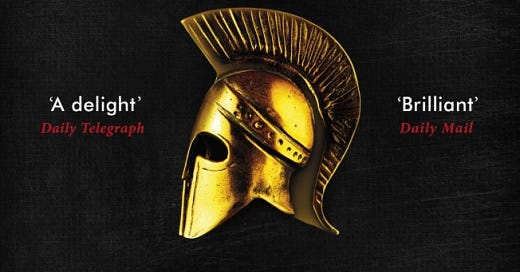You already know the plot: Paris, a spoiled Trojan prince, steals Helen, the most beautiful woman in the world, from her husband Menelaus. The Greeks launch a thousand ships to get her back. Achilles sulks, Hector fights, Odysseus schemes, and Troy burns.
In Stephen Fry's Troy (2020), though, you don't just get The Iliad. The book zooms out, tracing the origins of the war all the way from Zeus’ first bad decisions to the doomed city’s final moments.
“Zeus sighed heavily. 'I wish, all those years ago, Prometheus hadn't persuaded me to make mankind,' he said. 'I knew it was a mistake.”
You get the family drama, the prophecies, the gods playing chess with mortal lives.
“The Olympians enjoy the mauling and brawling of their playthings, their little human pets.”
He stitches together myths from Homer, Aeschylus, Euripides, and other ancient sources, filling in gaps with his own engaging commentary.
“His reward is the eternal fame that is both priceless and worthless.”
If you’re looking for a dry, scholarly take on the Trojan War, this isn’t it. Instead, Fry treats you to a grand, gossipy retelling of one of the most famous stories in history—complete with all the love, rage, betrayal, and divine meddling you could ask for.
Where Fry Shines
As with his Mythos and Heroes, Fry’s voice is the star here.
Fry approaches the Trojan War with the enthusiasm of a classics professor who moonlights as a stand-up comedian. The writing is casually brilliant, effortlessly funny, and always entertaining.
He breaks the fourth wall, throws in modern analogies, and delivers wry asides with impeccable timing.
But this isn’t just a comedy routine. Fry respects his source material. Besides Homer's The Iliad he weaves together Proclus's Chrestomathy, Virgil's Aeneid, and countless other ancient sources to create a comprehensive narrative that spans generations.
He takes time to develop characters, making even minor players feel real.
"Cassandra was right, as usual, poor thing, but being right isn't everything."
You don’t just hear about Achilles’ rage—you feel it.
“Although Achilles wore no armour, the mere sight of him, standing high on the embankment, bathed in an unearthly light and uttering the most piercing and monumental battle-cry was enough to scatter the Trojans. Three times Achilles yelled his terrible war cry. The Trojans and even their horses were filled with fear.”
The humour never undercuts the tragedy; it enhances it.
“Agamemnon heaved the gusty sigh of one much put upon by the weight of office, the malice of chance, and the endless incompetence of underlings.”
What sets Fry's version apart is his focus on the human cost of divine whims. He doesn't shy away from the brutality:
"War is war, and Homer never pretends otherwise."
Yet he finds moments of surprising tenderness, like when Hector says goodbye to his wife and son – a scene that punches you in the gut even if you know what's coming.
What might disappoint you
The book occasionally gets bogged down in genealogical details that feel more like a Wikipedia entry than a narrative.
Some readers might find Fry's frequent asides and contemporary references jarring:
"Think of Zeus as a celestial Harvey Weinstein, but with thunderbolts."
These modern parallels, while clever, sometimes break the spell of the ancient world.
And while his storytelling is smooth, there’s no new interpretation here. Fry isn’t trying to reinvent the Trojan War—he’s repackaging it for a modern audience.
That’s fine if you want a breezy, engaging retelling, but if you’re looking for a fresh take, you won’t find it.
The Verdict: Better than its movie namesake
Despite its occasional missteps, Troy succeeds brilliantly at its main task: making you care about a 3,000-year-old story as if it happened yesterday.
“How strange is our mortal zest for fame. Perhaps it is the only way humans can be gods. We achieve immortality not through ambrosia and ichor but through history and reputation.”
After reading this, you'll understand why these stories have endured – and why they still matter.
“The moment when flowers and fruits are at their fullest and ripest is the moment that precedes their fall, their decay, their rot, their death.”
In fact, Troy has already inspired several stage adaptations and has become required reading in some classical civilization courses.
Artists have created illustrations based on Fry's vivid descriptions, and his audiobook narration has become a benchmark for how to perform classical texts.
Whether you’re a longtime mythology buff or a casual reader who only knows the story from the movie Troy (2004) with Brad Pitt’s abs, you’ll find something to love, though you might never trust a gift horse again.
Read Next:
If you want more Fry, Mythos, Heroes, and The Odyssey complete his Greek mythology series.
For a more poetic, tragic take on Troy, Madeline Miller’s The Song of Achilles is stunning. Pat Barker’s The Silence of the Girls gives a sharp feminist take on Achilles and his world.
And if you want a deep-dive into Homer with all the nuance, Caroline Alexander’s The War That Killed Achilles is a great non-fiction pick.




